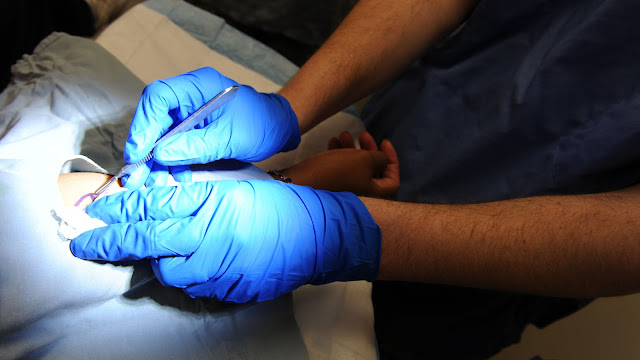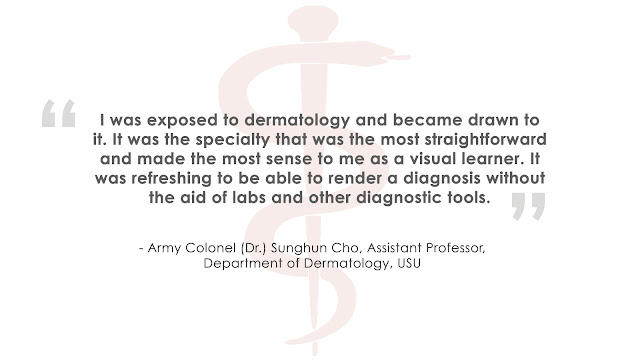5 Questions: What’s it Like to Work as a Dermatologist?
By Vivian Mason
 |
| Army Col. (Dr.) Sunghun Cho is an associate professor of Dermatology at USU and the dermatology consultant to the Army Surgeon General. (Photo credit: Tom Balfour, USU) |
Department: Dermatology
Title: Assistant Professor, Department of Dermatology, F. Edward Hébert School of Medicine, Uniformed Services University of the Health Sciences (USU); Attending Staff at Walter Reed National Military Medical Center; and Dermatology Consultant to theArmy Surgeon General
Years in Dermatology: 17
On Maintaining a Work/Life Balance: Create a schedule of what to do daily and more long term while prioritizing time with tasks based on urgency and importance.
Favorite Motivational Quote: “Duty, Honor, Country”
Sources of Inspiration: I am inspired by the people I work with. I’m surrounded by creative and supportive individuals in my department, at the Walter Reed clinic, and more broadly in the community of Army and military dermatologists. In my department, I am fortunate to have Drs. Leonard Sperling and Thomas Darling as mentors. Along with my Residency Program Director, Dr. George Turiansky (a USU alum), they were a big influence during my training, and I continue to learn from them.
A. Early in medical school, I wasn’t sure what I wanted to do and had interests in both internal medicine and surgical specialties. Then, I was exposed to dermatology and became drawn to it. It was the specialty that was the most straightforward and made the most sense to me as a visual learner. It was refreshing to be able to render a diagnosis without the aid of labs and other diagnostic tools. It’s an interesting specialty with more than several thousand disorders. Even now, I’m just as excited as our residents when I see a condition I have not encountered previously. It’s also a well-rounded specialty with a good mix of procedures and medicine.
Dermatology is more than just taking care of what you see in front of you because the patient may see their skin condition differently than you might anticipate. Also, there can be a good bit of psychology involved in patient interactions. Often, you will be working together to come up with the right solutions. The practice of dermatology is an excellent intersection of art and the science of medicine.
A. As a dermatology professor, you are both a student educator and a practicing dermatologist. This can be as a general dermatologist like me or a subspecialist. Most general dermatologists practice in the clinic setting evaluating common skin disorders (e.g., eczema, warts, psoriasis, acne, etc.), as well as performing skin checks. We also provide care to sicker patients, especially acting as consultants for patients admitted to the hospital. I work with students and residents during these patient interactions so that they can learn how to take care of these skin conditions.
Outside of the clinic, I teach students in classroom settings, develop teaching materials, and prepare for upcoming lectures. As academic staff, I’m also involved in research and publications, especially on topics related to healthcare delivery in our active duty population and medical education. As a professor, you may hold additional related roles. I’m involved with the Dermatology Interest Group at USU as faculty advisor and serve as the Clerkship Director for clinical rotations in dermatology.
A. I enjoy watching our students and residents mature into competent physicians. It’s amazing to see the students become colleagues and leaders in the military health system. On a day-to-day basis, the variety of work and the opportunity to interact with a diverse group of people are fulfilling aspects of my job.
I like the combination of teaching students and residents, seeing patients in clinic, and working with colleagues and students on projects. I am also thankful that I have the additional opportunity to learn, grow, and contribute as the Dermatology Consultant to the Army Surgeon General.
A. I think it goes without saying that you should first be passionate about the practice of dermatology. This includes what we do on a daily basis, as well as procedures we commonly perform.
Second, being curious and open-minded are essential qualities as well, especially as a medical student. I think it’s important to do rotations in different specialties to figure out what you like and also to become well-rounded.
The third important quality is being able to work well with others. This is important not only in making human connections with patients, but also in developing strong teams and a healthy work environment.
 |
| USU dermatology faculty member, Army Col. (Dr.) Sunghun Cho teaches suturing and biopsy class during a meeting of the USU Dermatology Student Interest Group. (Photo courtesy of Col. Sunghun Cho) |
A. For USU medical students, you can find out more about the specialty through engagement with USU’s Dermatology Interest Group. You can also talk to me or other members in the Dermatology Department. We welcome the opportunity to serve as mentors.
You may have a good idea of what we do as dermatologists, but you really need to spend time in the clinic and interact with our patients, residents, and staff to see what we do on a daily basis. Most students will be able to rotate through a dermatology clinic during their advanced clinical rotations as fourth-years, or sooner during a selective rotation. There are also opportunities to shadow dermatologists at Walter Reed if you want earlier exposure.
As medical students, make sure you excel in medical school. Research and extracurricular activities are important, but should come after you have become proficient in your coursework. My recommendation for first-year students is to see where you are at after three to six months of starting classes. If you are doing well, then you can plan for extra time in research or extracurricular activities. However, if you need the time to be competent in your studies, then continue to prioritize class work to excel as a medical student. It’s okay to give yourself a little time to figure things out.






